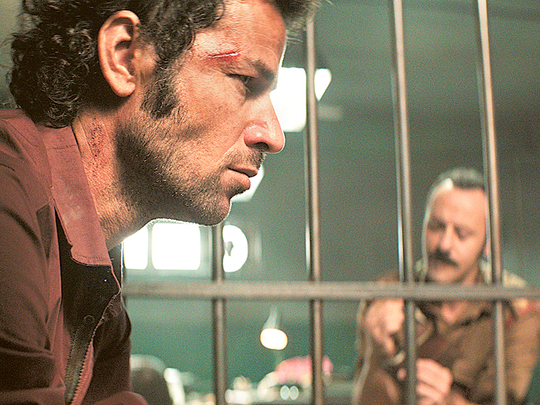
Two and a half years ago, when Majid Al Ansari was a full-time employee at Image Nation, a film production company in Abu Dhabi, he came across a script, Rattle the Cage. It was a psychological thriller, written by an American couple, Ruckus and Skye Lane.
It was a very Southern script, on first read. But one thought nagged at Al Ansari until he couldn’t ignore it: “What if this became an Arabic film?”
He answered his own question by leaving his job, acquiring rights to the script and spending months rewriting it. With Image Nation on board as financers, and Palestinian actors Saleh Bakri and Ali Suliman as his leads, the 28-year-old Emirati found himself directing his first feature film.
On December 10, the final product, Zinzana, will show at Dubai International Film Festival. That same day, it will hit theatres across the UAE. It joins a mere handful of Emirati films that have made it to the big screen, including City of Life, Sea Shadow, Djinn and From A to B. According to Ansari, it breaks ground, genre-wise, and deviates from the norm in Arab cinema.
“We have a lot of brilliant movies coming out from Anne-Marie Jacer, from Hany Abou Assad, from Elia Suleiman. But their films are mostly talking about events happening in this area and in Palestine,” said Al Ansari.
“What we’re trying to do with Zinzana is balance that out — to really give the people that are having problems in Palestine, people that are having problems in Egypt [the chance to] go in a film and forget for an hour and a half. Just enjoy the movie for what it is, and enjoy art for what art is.”
In September, Zinzana, which translates to “prison cell”, premiered in Austin, Texas at the largest genre film festival in America, Fantastic Fest.
“It was incredible,” said Al Ansari. “We got eight amazing reviews. Variety basically said that people should study Zinzana to learn how to make films in one location.”
The film’s intensity lies in its bare-bones minimalism. For about 80 per cent of its running time, protagonist Talal and antagonist Dabaan are the only two characters onscreen. Behind bars, Talal is a desperate man seeking redemption and the forgiveness of his family. On the other side, Dabaan is the deranged official who forces him to play a game of cat-and-mouse that could cost Talal everything.
With nine cast members and a 60-strong crew, Al Ansari filmed over the course of six weeks. His team built the claustrophobic prison cell in a soundproofed warehouse in Amman, Jordan, though the film isn’t based in any specific country in the Middle East.
Was filming in one location scary? Did that restrict you?
I love the fact that I’m limited. I love the fact that I have to dig into every single creative pocket I have and find solutions of how to not make this boring. I prepped the living hell out of this film. I literally took five months of prepping it — I shot listed every single shot. We would never shoot from the same exact angle. We’d always shift the camera — whether it’s 15 inches to the left or right.
The lead actors are both known for their strong presence. How did you cast them?
I met Ali Suleiman on From A to B [by Emirati director Ali Mostafa]. I fell in love with him as a person, as a performer, as an actor. I think he’s brilliant. He’s one of the rare actors in this region that jumps. It was a new genre for him — a new genre for the Arab world. He plays a very beautiful character, very dimensional, very crazy, but not always. Dabaan is definitely the spotlight of the film. Saleh also came through the producer Rami Yasin.
Did they bring something to the characters that you hadn’t anticipated?
A lot of it. Me, as a director, I have a democratic way of looking at things. I’m not a dictator; I don’t like to be like that. A lot of it was us working together, throwing ideas around and trying them out. If it fails, it fails, we’ll try something new.
Were there any other stand-out characters?
I feel like Yasa, I’m so proud of. She plays one of the predominant characters in the film, and she’s one of the characters that really steal the show. It’s Yasa’s first time [acting] in a film. She plays the deputy cop that just comes in in the middle of what’s happening. She’s a trainee, in a way where she doesn’t know the protocol, she doesn’t know what’s right and wrong, so Dabaan really takes her on a ride. Dabaan uses her as a tool to threaten the main character. Dabaan is this kind of playful guy — he loves these psycho, dark games, so he uses human beings as his dark games.
As the director, what were you aiming for, visually and in terms of cinematography?
There was a lot of references. I definitely wanted to get that darkness and neo-noir feel. I love Asian cinema. We reference a lot of Park Chan-wook’s work — he directed The Vengeance Trilogy and did a great movie called Thirst. We loved the darkness that Park Chan-wook had, but also, the Baz Luhrmann films as far as energy, blocking and camera angles. There’s a bit of [David] Fincher, there’s a bit of Guy Ritchie. I had a list of a hundred filmmakers I was studying.
How would you sum up the cinematography in three words?
It’s dark, but not too dark. It’s colourful. And it’s fun. Even the cinematography is fun.
‘Fun’ might not the first word people think when it comes to psych-thrillers. How was it fun?
For example, I used a method of a free camera. Yes, true, we have one location. We’re locked in this prison, this police station, and we can’t get out of this small cage. Everyone is locked into this cell, except for one character — the camera. The camera should move wherever the hell it wants to go. It can go through bars. It can go through walls. That’s what I mean by fun. The camera is very organic.
You’re a first time filmmaker. What was your biggest hurdle making this movie?
I didn’t want it to be my first and last film. It’s a burden. Every Emirati film has to be better than the next, and I really mean that. Not better as a film, but by helping raise the bar of Arabic cinema. I’m very sick of hearing, ‘Arabic films can’t be as good.’ If you ask me what films are my favourite films, I’d say Asian films. And looking at that, I’m like, ‘Why can’t Arab films be my favourite films?’
Ali Mostafa did City of Life, [Emirati director] Nawaf Al Janahi did Sea Shadow. Every film raised the bar. This was my biggest concern: I have to have Zinzana raise that bar further. And God willing, Ali Mostafa’s next film, The Worthy, will raise that bar even more. It will be better than Zinzana. That’s what we need.











